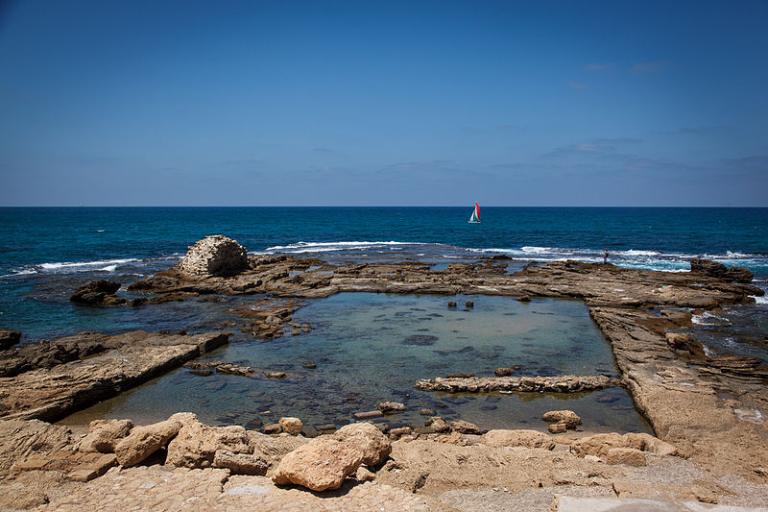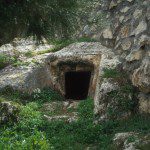
(Wikimedia Commons public domain photo)
An article of mine appeared in Meridian Magazine a few hours ago: “Understanding the Synagogues of Jesus’ Day.”
***
We left Jerusalem this morning and drove down to Caesarea Maritima, to the Herodian aqueduct that fed it from the north, and then to Joppa (or Jaffa, or Yafo). Joppa is one of the oldest cities in the Near East, while Tel Aviv , which is far larger, was only established in the twentieth century (by Zionist farmers setting out from Joppa). Joppa is also very pretty, situated on a slightly elevated promontory that juts out into the Mediterranean. It’s something of an arts center today, shared by both Jews and Arabs.
It was from Joppa, according to the Old Testament, that the prophet Jonah set out, seeking to escape the Lord’s call for him to preach in Nineveh. And it was in Joppa, in the house of Simon the Tanner, that the apostle Peter received his vision of the clean and unclean beasts, which paved the way for taking the Gospel to the gentiles. According to Greek mythology, it was also at Joppa that Andromeda was chained to a rock as an offering to the sea monster Cetus, from which she was saved by the hero Perseus — in what is probably one of the earliest surviving “princess and the dragon” stories.
Here’s a relevant column, entitled “Line upon line, the Lord has gradually expanded our vision of his work — and ours,” that I published on 9 May 2013 in the Deseret News:
According to Acts 10, the apostle Peter received a revelation while visiting the town of Joppa in which God commanded him to eat meat considered ritually unclean under Jewish law. Symbolically, this indicated that it was time to take the gospel to the Gentiles — to non-Jews.
The importance of this event for the development of Christianity cannot be overstated. Without it, Christianity would have remained merely a sect of Judaism.
Acts tells us that Cornelius — the Roman centurion stationed in Caesarea some distance up the coast from Joppa — “feared God.” In historical context, this suggests that he was among the fairly large number of Gentiles, often termed “God-fearers” by modern scholars, who deeply admired Jewish ethical monotheism but were unwilling to convert.
Jewish dietary and social restrictions would have severed their ties to family and friends, and circumcision understandably intimidated roughly 50 percent of potential proselytes. Soon after Peter’s vision, Christianity would become the “good parts version” of Judaism for such sympathetic outsiders — it was, effectively, Judaism for Gentiles.
Peter drew the salient lesson from his experience: “Of a truth I perceive that God is no respecter of persons: But in every nation he that feareth him, and worketh righteousness, is accepted with him” (Acts 10:34-35).
Appropriately, Peter’s revelation came to him in Joppa, for that small and very ancient peninsular town (also known as “Jaffa” and “Yafo”) is associated with yet another story illustrating the universality of God’s loving concern. According to the famous tale of Jonah the prophet, Jonah was commanded to preach repentance to Assyrian capital Nineveh, a powerful and threatening superpower at the easternmost extreme of Israel’s world. But instead he took ship at Joppa, heading exactly the opposite way.
Tarshish was probably in Spain, the westernmost boundary of ancient Israel’s map. He seems to have imagined that, by leaving Israel’s territorial waters, he could escape the jurisdiction, and notice, of Israel’s God.
He was wrong.
Subsequently, having preached to the Ninevites, Jonah sat on a hillside and sulked because, in fact, they had repented. And his irritation only increased when a plant died that had shaded him from the intense sun.
“Then said the Lord, Thou hast had pity on the gourd, for the which thou hast not laboured, neither madest it grow; which came up in a night, and perished in a night: And should not I spare Nineveh, that great city, wherein are more than sixscore thousand persons that cannot discern between their right hand and their left hand; and also much cattle?” (Jonah 4:10-11)
Very plainly, the Lord has been gently seeking to extend our vision, to help us grasp the full magnitude of our task. He has done it gradually, so as not to overwhelm us. Our earliest missionaries to Brazil were German-speakers, sent to preach to German emigrants there. Only later did we begin to take the gospel, with remarkable success, to all Brazilians.
In earlier days, some of us imagined it sufficient — in order to check India off our list — to preach a sermon on the quay in Bombay. Now we know better. Taking the gospel to “all nations” is a bigger assignment than we had understood — bigger than we could have managed.
In the LDS Church’s early decades, faithful Saints lacking access to the records of their ancestors were sealed by adoption to other prominent members to whom they were unrelated. This seemed manageable. In 1894, however, President Wilford Woodruff announced by revelation that the Saints were obliged to search out and be sealed to their own ancestors, as far back as possible. Also that year, the Genealogical Society of Utah was established to make this feasible.
“For behold, thus saith the Lord God: I will give unto the children of men line upon line, precept upon precept, here a little and there a little; and blessed are those who hearken unto my precepts, and lend an ear unto my counsel, for they shall learn wisdom; for unto him that receiveth I will give more; and from them that shall say, We have enough, from them shall be taken away even that which they have.” (2 Nephi 28:30)
By the way, a new discovery was made just a short while ago at Caesarea Maritima, during fairly routine construction. They found a Roman-period archway and tunnel that may actually be the place where the apostle Paul was imprisoned for approximately two years (see Acts 23:23-Acts 26:32). This was the first time that I had seen the new excavation; it wasn’t there when we last visited in November.












